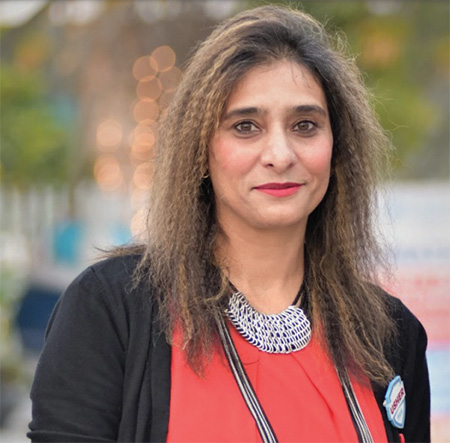 Riffat Abbasi, Receptionist/Telephone Operator at the WHO Pakistan country office.As part of WHO’s ongoing Diversity, Equity and Inclusion (DEI) initiatives for a respectful workplace, Riffat Zahoor Abbasi, Pakistan country office receptionist and member of the Regional Office’s DEI regional catalyst group, speaks about the importance of tolerance, acceptance and empathy.
Riffat Abbasi, Receptionist/Telephone Operator at the WHO Pakistan country office.As part of WHO’s ongoing Diversity, Equity and Inclusion (DEI) initiatives for a respectful workplace, Riffat Zahoor Abbasi, Pakistan country office receptionist and member of the Regional Office’s DEI regional catalyst group, speaks about the importance of tolerance, acceptance and empathy.
Incorporating these three factors in our day-to-day work comes in many forms. As an international organization containing diverse personalities hailing from different backgrounds, Ms Abbasi thinks that an “empathy lens” should be put on prior to dealing with others during the day ahead.
She adds that by looking inwards and practicing acceptance, tolerance and forgiveness towards others, a sense of peace will result in the workplace, as opposed to the feelings of anxiety or even depression that can arise when colleagues feel excluded.
People will forget what you said and did, but not how you made them feel
As staff shape and mold the workplace culture, she points to the importance of listening to suggestions from colleagues at all levels. “If these suggestions and voices are unheard, something constructive can easily be dismissed,” she says. Feelings of resentment may build up and be misplaced towards others, whilst good relationships with others increases trust and work productivity.
She also emphasizes the importance of including all colleagues in social activities, such as having lunch together, to build a sense of connectedness. “Unconscious biases make people feel lonely, excluded, and affect work productivity” she says, adding that newcomers need to be welcomed and have their presence acknowledged, including through organized orientations.
At an organizational level, she feels that training can be provided on the harmful effects of exclusionary behaviours and practices on the work at hand. On an individual level, making others feel comfortable and establishing a safe and secure zone no matter how small it may seem, can help in creating change.
When we are healthy and feel good, we are also good for our family and others


